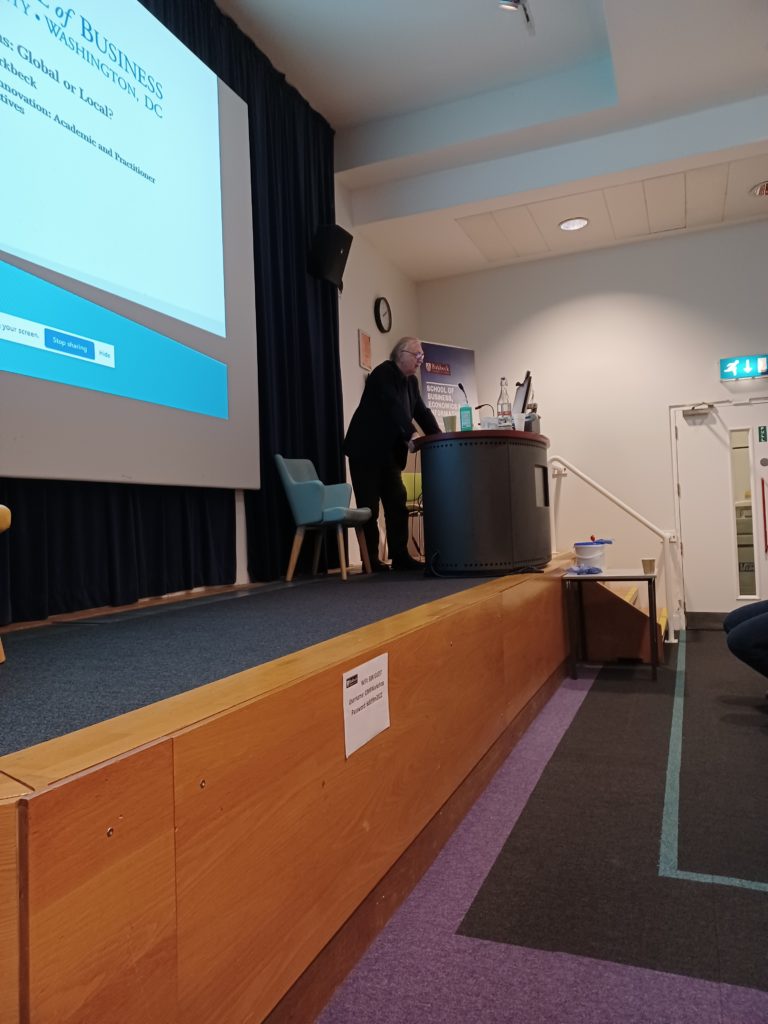Colleagues from academia, business and policy joined the CIMR to share insights into the future of innovation.
On Wednesday 1 June, the CIMR was delighted to welcome researchers from our partner institutions American University, University of Vaasa and Henley Business School, together with representatives from Innovate UK, the UK Intellectual Property Office and Climate Policy Initiative, to share insights into global, sustainable innovation.
Professor Helen Lawton Smith, Director of the CIMR, introduced the hybrid workshop, which was hosted on Birkbeck’s Bloomsbury campus with the option for international attendees to join online.
Panel 1: Academic Perspective
Part one, chaired by Professor Martin Meyer, University of Vaasa, invited academic colleagues to open the discussion.
Professor Tomasz Mrockowski, American University, discussed whether innovation clusters are still a powerful engine of successful innovation and of local development in the context of rapid globalisation. Tomasz noted a growing trend for large corporations to work with startups, who are able to operate more efficiently, and for clusters to open into ecosystems that can operate on a global scale.
Dr Helka-Maria Kalliomäki, University of Vaasa, presented on productive interactions for sustainable innovation, stressing that sustainable innovation needs to be supported by effective knowledge exchange and co-creation mechanisms between producers and users of scientific knowledge. Her research highlights that both academics and practitioners need the appropriate skills to collaborate effectively, such as the ability to reflect on the usability of research and identify the potential relevance of results.
Dr Brett Gilbert, American University, brought the discussion to innovation in emerging markets. Brett noted that innovation in emerging economies looks different: it is adaptive, incremental and developed for immediate needs. Her research has looked to understand the mindset of innovators and the human characteristics that lead to the creation of knowledge.
Finally, Dr Emma Chen and Dr Anna Fung, American University, shared their perspective on what drives China’s innovation. Anna commented on policy changes that have enabled greater innovation and collaboration between government, enterprise and users. Universities are also playing an increased role in innovation in China, competing with other global leaders in innovation as a result of increased state funding.
Panel 2: Practitioner Perspective
The second panel, chaired by Dr Muthu De Silva, Assistant Dean (Research) at Birkbeck invited practitioners to share their perspective.
Rita Trehan, Henley Business School, discussed the impact of the COVID-19 pandemic on accelerating global, sustainable innovation. She commented on the importance of listening for businesses – to academics, to consumers and to innovation networks in order to create inclusive, anticipatory organisations. Rita called for the integration of initiatives in ESG, the environment and diversity and inclusion to see greater progress, sharing Henley Business School’s Inclusivity Index to provide a framework for this type of collaboration.
David Golding, Head of Global Partnerships at Innovate UK, shared Innovate UK’s role in supporting businesses to do R&D and innovation on a global scale. David argued that global R&D and innovation collaboration results in stronger, more sustainable relationships which are more resilient in the face of challenges. Innovate UK is supporting businesses to access global markets and supply chains as they are forming.
Huw Watkins, Head of Asia Policy, Intellectual Property Office, UK, drew parallels between the work of the Intellectual Property Office and Innovate UK. IP (Intellectual Property) rights facilitate knowledge sharing, evidenced recently via the technology transfer occurring throughout the COVID-19 pandemic, and the Intellectual Property Office aims to facilitate global collaboration. Since 2009, the UK has operated a green channel for patent applications, seeking protection for environmental innovations.
Finally, Rajashree Padmanabhi, Analyst at Climate Policy Initiative, introduced the Global Innovation Lab for Climate Finance, a global initiative that aims to drive investment for climate change mitigation and adaptation. The Lab brings together over 70 institutions to address the sustainable investment gap through innovation, providing funding for environmental initiatives, particularly based in emerging economies.
A recording of this event is available to watch on YouTube.


